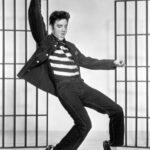Mary J. Blige has reigned as the Queen of Hip-Hop Soul for decades, delivering raw emotion and powerful vocals that resonate with millions. Her discography is a treasure trove of hits, blending R&B, soul, and hip-hop into a sound uniquely her own. From empowering anthems to heart-wrenching ballads, Blige’s songs have soundtracked life’s highs and lows. Here, we delve into 20 of her most iconic tracks, ranking them to celebrate her enduring legacy and impact on music.
20. Mary Jane (All Night Long) (1995)
Sampling the Mary Jane Girls’ 1983 classic “All Night Long,” this track from 1995 is more than just a cover; it’s a sophisticated reimagining. Blige’s smooth vocals glide over luscious samples from Teddy Pendergrass’s “Close the Door,” creating a languid and sensual vibe. The remix featuring LL Cool J further solidified its hip-hop credentials, making “Mary Jane” a standout moment in her mid-90s catalog, showcasing her ability to blend classic soul with contemporary sounds. It’s a testament to her ear for great source material and her talent for making it her own.
19. Love @ 1st Sight (2003)
Reigniting the magic of her collaboration with Method Man nearly a decade after “I’ll Be There for You/You’re All I Need to Get By,” “Love @ 1st Sight” explores the intriguing dynamics of instant attraction. Set against a hard-hitting, insistent beat, Blige contemplates the enigma of immediate physical connection. Method Man’s verse adds a raw, masculine counterpoint, creating a dialogue about desire and connection. This 2003 hit proved their chemistry was still potent, delivering a track that’s both tough and alluring.
18. Deep Inside (1999)
Driven by dramatic piano chords reminiscent of Elton John’s “Bennie and the Jets,” “Deep Inside” from 1999 taps into themes of authenticity and vulnerability. Similar to Jennifer Lopez’s “Jenny from the Block” in its message of staying true to oneself, Blige’s rendition is intensely personal and emotionally charged. Her raw delivery of lyrics like “I don’t have a lot of friends… Is it cash they see when they look at me?” lays bare her insecurities and struggles, making it feel like a genuine outpouring of her soul.
17. Be Happy (1994)
“Be Happy,” the closing track from Blige’s deeply personal second album, My Life, is a study in contrasts. Sampling Curtis Mayfield, the song initially presents an upbeat, danceable facade. However, beneath the surface, a palpable tension simmers. The lyrics reveal a cautious optimism, while the melody of the hook carries an underlying melancholy. This duality perfectly encapsulates the album’s themes of addiction, abuse, and mental health, highlighting Blige’s ability to convey complex emotions even within a seemingly upbeat track.
16. Take Me As I Am (2005)
Mary J. Blige’s Super Bowl Halftime Performance, showcasing her powerful stage presence.
By 2005’s The Breakthrough, Mary J. Blige had truly mastered the art of transforming personal struggles into compelling music. “Take Me As I Am” exemplifies this. Drawing inspiration from Lonnie Liston Smith’s mellow “Garden of Peace,” the song is paradoxically both relaxed and resolute. The beat possesses an unexpected hardness for a ballad, while the lyrics are fiercely defiant. This track is a powerful statement of self-acceptance and strength, characteristic of her mature work.
15. Share My World (1997)
The title track from her third album, Share My World, released in 1997, marks a noticeable shift towards a lighter, more accessible sound compared to her previous work. Produced by Rodney Jerkins, the track features a brilliant blend of disco-era syndrums and sleek synths, creating a glossy yet textured soundscape. Despite the smoother musical backdrop, Blige’s vocal performance retains a poignant ache, transforming what might seem like a love song into a heartfelt plea for connection and acceptance.
14. You Remind Me (1991)
“You Remind Me,” released in 1991, is a quintessential example of the groundbreaking “hip-hop soul” sound that defined Mary J. Blige’s debut album, What’s The 411?. It perfectly encapsulates the genre’s fusion: beats sampled from a Biz Markie track, Blige’s exquisitely controlled yet deeply emotive vocals, and a nod to classic soul through a chorus borrowed from Patrice Rushen. This track was instrumental in rearranging and reconfiguring musical traditions into something entirely new and innovative.
13. Love Is All We Need (1997)
A collaboration of titans, “Love Is All We Need” from 1997 boasts a booming, intricate production by Jam & Lewis and a guest verse from Nas at the height of his lyrical prowess. His contribution is genuinely inventive, complementing Blige’s commanding vocal presence and the song’s killer hook. Even as a celebratory ode to enduring romance, Blige injects a raw power and unmistakable attitude into her delivery, setting her apart from her contemporaries and solidifying her unique vocal signature.
12. Enough Cryin (2006)
The music video for “Enough Cryin,” released in 2006, suggests a direct link to Mary J. Blige’s tumultuous relationship with Jodeci’s K-Ci. Regardless of its specific inspiration, the song is a visceral and electrifying eruption of anger and resentment. It also introduces Blige’s rapping alter ego, Brook Lynn, who delivers sharp, assertive lines like, “Shoulda Marc Jacob Fe Fe bagged me when you had me.” This track showcases her versatility and willingness to explore different facets of her persona.
11. U + Me (Love Lesson) (2017)
While Mary J. Blige’s album releases became more sporadic in the later millennium, 2017’s Strength of a Woman delivered an undeniable gem with “U + Me (Love Lesson).” This heartbroken ballad, with its hazy, sun-drenched summer afternoon sound, paradoxically amplifies the sheer force of her vocal performance. It’s a testament to her enduring ability to craft powerful and resonant songs even as musical landscapes evolve.
10. All That I Can Say (1999)
Mary J. Blige previously featured on Lauryn Hill’s The Miseducation of Lauryn Hill on “I Used to Love Him,” and in 1999, Hill returned the favor by writing and producing “All That I Can Say.” This lead single from the Mary album is a stunning homage to early 1970s Stevie Wonder. Beautifully restrained for the first two minutes and forty seconds, the song then explodes with Blige’s multi-tracked vocals, creating a powerful and moving climax.
9. Not Gon’ Cry (1996)
“Not Gon’ Cry” from 1996 is a divorce narrative set to slow-motion beats and subtle psychedelic guitar riffs. While the title suggests resilience, the lyrics are more melancholic: “11 years out of my life / Besides the kids, I have nothing to show.” However, Blige infuses just enough steel and determination into her performance to imply the protagonist will ultimately find her strength and overcome the heartbreak. It’s a poignant portrayal of heartbreak and the slow journey toward healing.
8. My Life (1994)
“I grew up on Roy Ayers,” Mary J. Blige explained, revealing the inspiration behind transforming Ayers’ blissful “Everybody Loves the Sunshine” into the somber and deeply affecting “My Life.” This track from 1994 becomes a meditation on surviving a challenging upbringing and personal battles with depression and drug addiction. Lines like “Down and out, crying every day” are delivered with stark honesty, making it a raw and impactful exploration of personal struggle and resilience.
7. Just Fine (2007)
“Just Fine,” released in 2007, showcases Mary J. Blige in full party-starting mode, complete with an opening monologue urging listeners to hit the dance floor. Inspired by Michael Jackson’s “Don’t Stop ’Til You Get Enough,” the rhythm track is sparse yet urgent. Blige’s infectious exuberance – “No time for mopin’ around, are you kidding?” – makes this track utterly irresistible. It’s a pure celebration of joy and letting go of negativity.
6. No More Drama (2001)
Mary J. Blige’s iconic Glastonbury performance in 2015, a career highlight.
“No More Drama,” released in 2001, is a deeply cathartic and visceral song, wrapped in a masterful Jam & Lewis production that samples a soap opera theme. The song’s climax is breathtaking, and her legendary rain-soaked performance at Glastonbury in 2015 is widely regarded as one of the festival’s greatest moments. This track is an anthem of empowerment and shedding negativity, delivered with unmatched passion.
5. I Can Love You (1997)
Initially a B-side in the UK, “I Can Love You,” a 1997 collaboration between Mary J. Blige and Lil’ Kim, is nothing short of exceptional. The strings swell and sigh, creating a lush backdrop for Blige’s portrayal of unrequited heartbreak. Lil’ Kim’s verse offers a more direct and assertive approach to winning over the object of affection. Together, they create a dynamic and compelling track that deserves its place among Blige’s best.
4. Be Without You (2005)
According to Billboard, “Be Without You” is the most successful R&B/hip-hop song of all time. While the definition of “R&B/hip-hop” may be debated, its undeniable quality is not. Released in 2005, the song is lush, dramatic, and imbued with Blige’s signature emotional edge. Its crossover appeal led to a successful pop-house remix in the UK, proving its broad appeal and lasting impact. It’s a modern classic that exemplifies Blige’s ability to connect with audiences across genres.
3. Everything (1997)
Of all Mary J. Blige’s songs that openly and respectfully draw inspiration from soul music’s past, “Everything,” released in 1997, stands out. Revisiting the Stylistics’ “You Are Everything,” the production cleverly plays on the song’s familiarity while providing Blige ample space to transform it into something uniquely her own. It’s a perfect example of how she honors her musical roots while forging her own path.
2. Real Love (remix) (1992)
The hip-hop remix of “Real Love” from 1992 will forever be remembered as the track that introduced the world to the Notorious B.I.G. However, his brilliant guest verse should not overshadow the brilliance of the song itself. Sampling Betty Wright’s joyous “Clean Up Woman,” the track bounces with infectious energy, perfectly complementing Blige’s powerful performance. It’s a foundational track in her discography and a landmark moment in hip-hop soul.
1. Family Affair (2001)
“Family Affair,” released in 2001, is the pinnacle of Mary J. Blige’s party anthems. Bringing together an artist known for exploring heartbreak and adversity with a producer synonymous with hip-hop, Dr. Dre, the result is one of the greatest pop-R&B party tracks ever created. Everything about “Family Affair” is perfection: Dr. Dre’s deceptively simple yet incredibly effective production—a piano riff, staccato strings, a driving beat—Blige’s economical, understated vocal delivery, and the anthemic quality of every melody line. With the iconic line, “Don’t need no hateration, holleration in this dancery,” it’s an unparalleled call to dancefloor liberation and forgetting your troubles.


